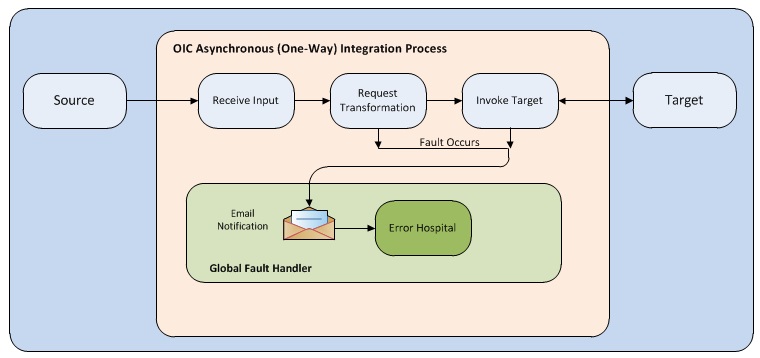Solution Overview
The technical aspects involved in the integration between Oracle Utilities Customer Cloud Service and Oracle Utilities Digital Asset Cloud Service are:
• The integration layer consists of integration processes deployed on Oracle Integration Cloud.
• The integration processes interact with other applications using the following adapters:
• Oracle Utilities Adapter interacts with the CCS REST APIs.
• REST Adapter interacts with Oracle Cloud Infrastructure Object Storage APIs.
• FTP Adapter interacts with the Oracle Utilities Customer Cloud Service and Oracle Utilities Digital Asset Cloud Service on-premises server to list, get, and rename files in the server.
• Two types of email notifications can be configured in this integration, namely, business and technical error email notification. Email notifications are optional, but by default are enabled.
• Business email notifications:
Configure the following properties in the OUTL-BRT-CCS_DACS_ConfigProps lookup:
• Property name notification.email.process.complete.flag to 'true' to receive email notification when the process is completed or partially processed. By default, this is set to 'true'.
• Property name notification.email.process.nofile.flag to 'true' to receive email notification when no file is found in the source location. By default, this is set to 'true'.
The recipient(s) of these email notification are configured in the to.process.notification recipients of the OUTL-BRT_CCS_DACS_Email_ID lookup. These are sent to the business users of the applications.
• Technical error email notifications:
Configure the following properties in the OUTL-BRT-CCS_DACS_ConfigProps lookup:
• Property name notification.email.error.flag to 'true' to receive email notification when errors are encountered. By default, this is set to 'true'.
The recipient(s) of the email notification sent out for technical errors is configured in the to recipients of the OUTL-BRT-CCS_DACS_Email_ID lookup. These are sent to the administrators of the applications.
• The OUTL-BRT-CCS_DACS_ConfigProps lookup is used to define the default values needed by the integration flows. Make sure the properties in the lookup are configured.
• For Scheduled Integration processes related to file transfer, make sure the dependent application extract processes are ran first so the files are already available in the content server for the integration process to pick up.
• The integration uses One-way Asynchronous pattern.
One-way Asynchronous
The one-way asynchronous integration process:
1. Receives request message from the source application.
2. Transforms message from the source to the target format. Lookups are used for data translations, if applicable.
3. Invokes target application to send the request message.
4. In case of any error, the global fault handler catches the error.
5. An optional email notification is sent to the respective users as configured.
6. The error instance can be re-submitted from Oracle Integration Cloud. Refer to the Error Handling section in Configuring Lookups, Error Handling, and Email Notifications for more details. 
